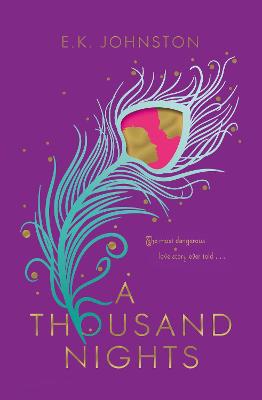Reviewed by Kat @ Novels & Waffles on
3.5. When I think of the famous Middle Eastern folk tale, One Thousand and One Nights, my mind is automatically drawn to the Disney movie, Aladdin. Robin William's voice rings in my ears, and I find myself humming along to Genie's song: "Well Ali Baba had them forty thieves, Scheherazade had a thousand tales..." (I admit it: I am a big Disnerd).
As the song continues, Genie conjures up a few dancing women for Aladdin's delight. This caricature of a veiled, scantily clad girl is a model of what Western media has traditionally associated with women from the Middle East; she is hyper-sexualized and erotic. She is a belly dancer and a harem girl.
Johnston is very aware of these stereotypes, and she turns them all on their head. In her book, A Thousand Nights, she takes the trope of an exotic desert beauty, deconstructs it, and then rebuilds it into something new and empowering. In the end, her message is this: women are strong and there is power to be found in female solidarity.
The story begins with a man. This man just so happens to be a king named Lo-Melkhiin. And Lo-Melkhiin needs a bride. Here is where the conflict begins – every woman he marries inevitably dies. Lo-Melkhiin cannot be brideless, heaven forbid, so a law is created that states one girl from each village must be sacrificed. Each will be sent unwillingly to the bed of their king and then their deathbeds.
Enter the main character. She is a girl who offers herself up to Lo-Melkhiin in true YA fashion in order to save the life of her sister ("I volunteer as tribute!"). Although this is not a particularly new or revolutionary premise, there is something about its execution that makes it stand out. The reason for this is largely due to to the main character. We are never given her name, but she fights against a man—and a world—that assumes a woman can't fight. She doesn't fight with swords and spears, but with her weaving and her loom, thus redefining what it means to be courageous and what it means to fight. She is a true heroine, one worthy of taking center stage in this age of feminism.
This is the second retelling of One Thousand and One Nights that I have read, the first being [b:The Wrath and the Dawn|18798983|The Wrath and the Dawn (The Wrath and the Dawn, #1)|Renee Ahdieh|https://images.gr-assets.com/books/1417956963s/18798983.jpg|26724902] by Renee Ahdieh, which was also released in 2015. Although they draw from the same source material, they couldn't be more different. The Wrath and the Dawn is a fast-paced romance novel with fantasy elements sprinkled in. This book is beautifully atmospheric and has a slow, deliberate pace. It drags a bit in places, but the courage of the main character, along with all its desert setting, make it an engaging read.
In short, if you are looking for a dramatic novel full of Marvel-esque action and electric sexual tension, then this might not be the book for you. If what you want, however, is an elegantly written story with a message that will make you ask questions – questions about women's role in society, about what it means to be a strong woman – then by all means add this one to your "to-read" list.
Here is one last quote for the road: "We prospered under Lo-Melkhiin – or, men did, and it was men who keep the accounts of everything, from grain and sheep to life and death."
Reading updates
- Started reading
- 22 June, 2018: Finished reading
- 22 June, 2018: Reviewed
